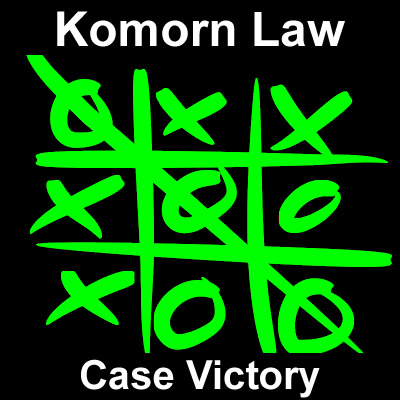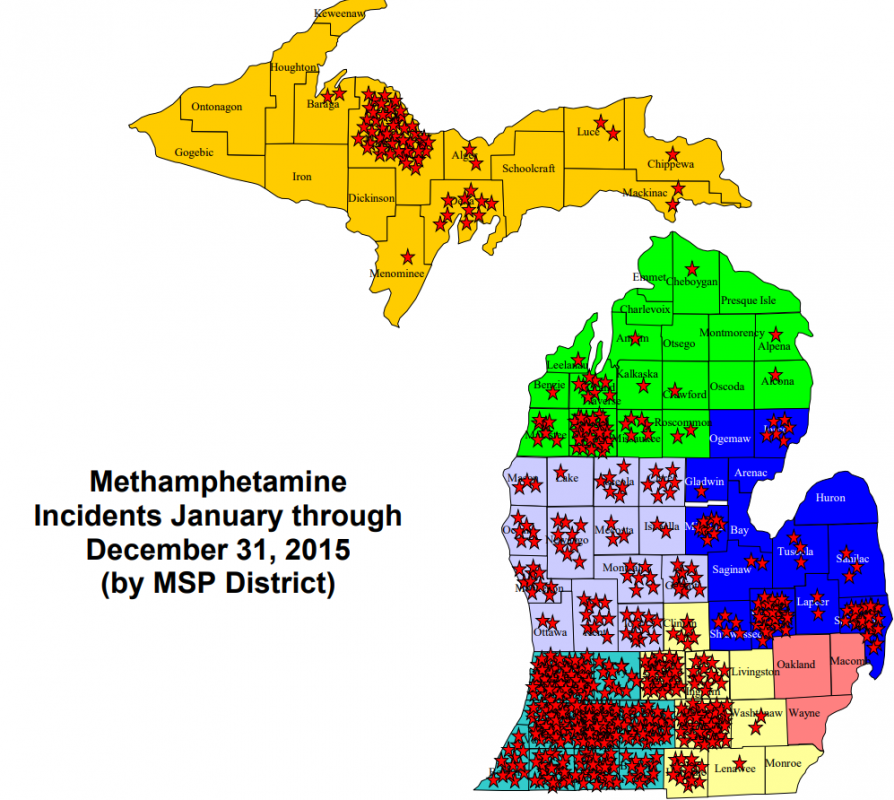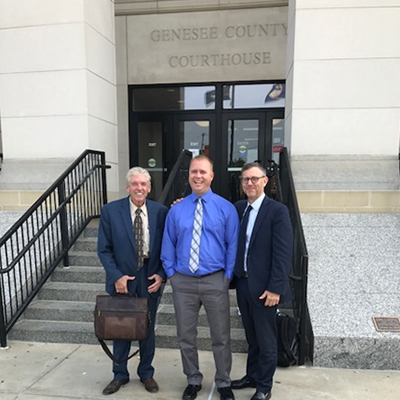No Results Found
The page you requested could not be found. Try refining your search, or use the navigation above to locate the post.

Whitmer expressed her support in her 2025 budget recommendations for legislation that would automatically charge vehicle owners a fee for entry to state parks.
Another fine piece of legislation introduced House Bill 5428, which would automatically take from vehicle owners a $10 entry fee for the recreation passport, regardless of whether they visit state parks.
Vehicle owners who do not want to pay the fee would have to request a refund from the Michigan Department of Natural Resources, within 30 days of the charge.
Related Articles
The page you requested could not be found. Try refining your search, or use the navigation above to locate the post.

When facing criminal charges you have the right to have a trial by jury. The justice system will offer you the right to a jury trial. It's just a matter if you can afford that right. A jury trial with an attorney that is not a public defender can be costly. If you...

Police are allowed to lie to you. One might believe that if you ask an undercover cop if they are a police officer they have to tell you. That’s not true. Police can and will lie to you. It's legal for cops to lie The Police may legally lie, bluff, mislead and...

Komorn Law clients speak about their experience with the legal system Several of Komorn Law client's as well as other individuals have chosen to speak about their encounter with law enforcement, the legal system and how it has affected their lives, families and...

Marijuana Criminal Defense Client with medical marijuana card was charged with marijuana possession. Client was assigned a court appointed lawyer and encouraged to plead guilty and accept 3 months of probation. Client hired Michael Komorn for representation and...

Bill Schuette, the current Michigan Attorney General, is waging war against Meth users, dealers and labs. Innocent people get swept up with meth crimes when police run field tests on any powdery substances, frequently returning false positive results. Komorn...
Two families -- including one mom who alleges Child Protective Services took her suckling baby from her breast -- are suing the state, alleging discrimination because they are medical marijuana users and poor. In the lawsuit, attorney Michael KOMORN alleges the...
Here are some links to articles posted by Attorney Michael Komorn US Government Collecting and Using Citizen Communications NATIONAL TOXICOLOGY PROGRAM Technical Report Series No. 446 (1996) Oral cannabis extracts as a promising treatment for the core...

Komorn Law PLLC is proud to report a ruling today from the Genesee County Circuit Court. This case involved my client's property and all kinds of salacious allegations of really bad behavior by this property, and I mean bad stuff, like stuff you could never...

KOMORN LAW AVVO - RATINGS Read Client AVVO Reviews

Komorn Law | In the News | Fox 17 News | Links Medical marijuana battle: Father fights for custody of son OTTAWA COUNTY, Mich. – Medical marijuana is a controversial, sometimes sticky issue, especially in Michigan. Max Lorincz is a father from Spring Lake who...

Deceased goats pointed Calhoun County deputies in the direction of a much larger investigation over the weekend.
Deputies had been called to Cooper Avenue near Burton Street Saturday for an animal welfare complaint, and found four dead goats at the back of the property, according to the Calhoun County Sheriff’s Office Monday.
Read more here
Related Articles
The page you requested could not be found. Try refining your search, or use the navigation above to locate the post.

When facing criminal charges you have the right to have a trial by jury. The justice system will offer you the right to a jury trial. It's just a matter if you can afford that right. A jury trial with an attorney that is not a public defender can be costly. If you...

Police are allowed to lie to you. One might believe that if you ask an undercover cop if they are a police officer they have to tell you. That’s not true. Police can and will lie to you. It's legal for cops to lie The Police may legally lie, bluff, mislead and...

Komorn Law clients speak about their experience with the legal system Several of Komorn Law client's as well as other individuals have chosen to speak about their encounter with law enforcement, the legal system and how it has affected their lives, families and...

Marijuana Criminal Defense Client with medical marijuana card was charged with marijuana possession. Client was assigned a court appointed lawyer and encouraged to plead guilty and accept 3 months of probation. Client hired Michael Komorn for representation and...

Bill Schuette, the current Michigan Attorney General, is waging war against Meth users, dealers and labs. Innocent people get swept up with meth crimes when police run field tests on any powdery substances, frequently returning false positive results. Komorn...
Two families -- including one mom who alleges Child Protective Services took her suckling baby from her breast -- are suing the state, alleging discrimination because they are medical marijuana users and poor. In the lawsuit, attorney Michael KOMORN alleges the...
Here are some links to articles posted by Attorney Michael Komorn US Government Collecting and Using Citizen Communications NATIONAL TOXICOLOGY PROGRAM Technical Report Series No. 446 (1996) Oral cannabis extracts as a promising treatment for the core...

Komorn Law PLLC is proud to report a ruling today from the Genesee County Circuit Court. This case involved my client's property and all kinds of salacious allegations of really bad behavior by this property, and I mean bad stuff, like stuff you could never...

KOMORN LAW AVVO - RATINGS Read Client AVVO Reviews

Komorn Law | In the News | Fox 17 News | Links Medical marijuana battle: Father fights for custody of son OTTAWA COUNTY, Mich. – Medical marijuana is a controversial, sometimes sticky issue, especially in Michigan. Max Lorincz is a father from Spring Lake who...

In Michigan driving is considered a privilege. with this privilege comes immense responsibility, especially when it comes to driving under the influence (DUI) as well as other responsibilities.
The consequences of youth DUI extend far beyond the immediate legal penalties.
DUI means “Driving Under the Influence”.
This could mean alcohol, marijuana, prescription drugs or anything they may consider that would impair your driving.
A DUI can leave a lasting impact on young lives, affecting everything from educational opportunities to future career prospects.
In such dire situations, seeking legal counsel becomes not just an option, but a crucial necessity.
Every year, countless young drivers find themselves facing DUI charges, often due to a combination of inexperience, peer pressure, and poor decision-making.
The ramifications of such actions can be devastating. Beyond the legal repercussions—which may include fines, license suspension, and even imprisonment—youth DUI can have far-reaching consequences.
For many young individuals, education is the gateway to future success. However, a DUI conviction can derail even the most promising academic trajectories.
College admissions officers and scholarship committees often scrutinize applicants’ criminal records, and a DUI conviction can significantly diminish one’s chances of acceptance or financial aid.
Additionally, some educational institutions may impose disciplinary measures, such as probation or expulsion, further jeopardizing a student’s academic pursuits.
The reverberations of a youth DUI can extend well into adulthood, impacting career opportunities and professional advancement.
Many employers conduct background checks as part of the hiring process, and a DUI conviction may raise red flags, particularly in fields that require driving or involve sensitive responsibilities.
Moreover, certain professions, such as law enforcement or healthcare, have strict ethical standards that may preclude individuals with DUI convictions from employment or licensure.
The long term fallout from a DUI goes beyond its immediate legal and professional implications, taking a toll on one’s personal and financial well-being.
Fees, court costs, and increased insurance premiums can exact a heavy financial burden, straining already precarious budgets.
In the long run it may be a better option to fight the charge and get it reduced with an experienced attorney rather than submit to a guilty plea.
Moreover, the stigma associated with DUI can lead to social ostracization and strained relationships with family and friends, exacerbating feelings of isolation and shame.
In the face of such daunting challenges, hiring an experienced attorney is paramount. A skilled DUI defense lawyer can provide invaluable guidance and advocacy, working tirelessly to mitigate the consequences of youth DUI charges. Here are some compelling reasons to seek legal representation:
1. Expertise in DUI Law: Navigating the complexities of DUI law requires specialized knowledge and expertise. A seasoned attorney understands the nuances of local statutes, procedural rules, and case precedents, allowing them to mount a strategic defense tailored to the unique circumstances of each case.
2. Protection of Rights: The legal system can be intimidating, especially for young defendants unfamiliar with their rights and legal procedures. A competent attorney serves as a staunch advocate, safeguarding their clients’ constitutional rights and ensuring fair treatment throughout the legal process.
3. Mitigation of Penalties: While the consequences of youth DUI can be severe, they are not set in stone. A skilled attorney can explore avenues for mitigating penalties, such as negotiating plea bargains, pursuing alternative sentencing options, or challenging the validity of evidence against the defendant.
4. Advocacy in Court: Facing DUI charges in court can be a daunting prospect, but with the right legal representation, defendants can level the playing field. A proficient attorney will skillfully present evidence, cross-examine witnesses, and argue legal points on behalf of their clients, maximizing the chances of a favorable outcome.
5. Support and Guidance: Beyond their legal expertise, attorneys also provide invaluable support and guidance to their clients during what is often a tumultuous and stressful time. From explaining legal proceedings to offering emotional reassurance, a compassionate attorney can help alleviate some of the anxiety and uncertainty associated with DUI charges.
Related Articles
The page you requested could not be found. Try refining your search, or use the navigation above to locate the post.

When facing criminal charges you have the right to have a trial by jury. The justice system will offer you the right to a jury trial. It's just a matter if you can afford that right. A jury trial with an attorney that is not a public defender can be costly. If you...

Police are allowed to lie to you. One might believe that if you ask an undercover cop if they are a police officer they have to tell you. That’s not true. Police can and will lie to you. It's legal for cops to lie The Police may legally lie, bluff, mislead and...

Komorn Law clients speak about their experience with the legal system Several of Komorn Law client's as well as other individuals have chosen to speak about their encounter with law enforcement, the legal system and how it has affected their lives, families and...

Marijuana Criminal Defense Client with medical marijuana card was charged with marijuana possession. Client was assigned a court appointed lawyer and encouraged to plead guilty and accept 3 months of probation. Client hired Michael Komorn for representation and...

Bill Schuette, the current Michigan Attorney General, is waging war against Meth users, dealers and labs. Innocent people get swept up with meth crimes when police run field tests on any powdery substances, frequently returning false positive results. Komorn...
Two families -- including one mom who alleges Child Protective Services took her suckling baby from her breast -- are suing the state, alleging discrimination because they are medical marijuana users and poor. In the lawsuit, attorney Michael KOMORN alleges the...
Here are some links to articles posted by Attorney Michael Komorn US Government Collecting and Using Citizen Communications NATIONAL TOXICOLOGY PROGRAM Technical Report Series No. 446 (1996) Oral cannabis extracts as a promising treatment for the core...

Komorn Law PLLC is proud to report a ruling today from the Genesee County Circuit Court. This case involved my client's property and all kinds of salacious allegations of really bad behavior by this property, and I mean bad stuff, like stuff you could never...

KOMORN LAW AVVO - RATINGS Read Client AVVO Reviews

Komorn Law | In the News | Fox 17 News | Links Medical marijuana battle: Father fights for custody of son OTTAWA COUNTY, Mich. – Medical marijuana is a controversial, sometimes sticky issue, especially in Michigan. Max Lorincz is a father from Spring Lake who...

Cases before that are still under review.
A former DNA analyst with the Colorado Bureau of Investigation (CBI) manipulated DNA results and “cut corners” – and as a result, all of her work at the agency over nearly 30 years has been called into question.
Those findings emerged from an internal affairs investigation that commenced in September and pertained to Yvonne “Missy” Woods, a devoted employee who has served the CBI faithfully for 29 years. This announcement was made by the agency on Friday.
The Weld County Sheriff’s Office fired a DNA analyst, who worked at a local lab for over 10 years, after an investigation found “anomalies” in her work. FOX31’s Talya Cunningham hears from a legal expert about what this could mean for the cases involved.
New York City’s crime lab has been a pioneer nationally in analyzing especially difficult DNA samples. But the recent disclosure of the source code for its proprietary software is raising new questions about accuracy.
Unlike finicky fingerprints and frowned-upon fiber analysis, DNA evidence has been the most bulletproof evidence for forensic sciences in recent years. But staffers at a research firm in Israel have recently upended the presumed infallibility of this forensics golden child—by making it themselves. Nucleix, a Tel-Aviv-based life sciences company, was able to create credible DNA evidence that could be used to finger the wrong person, proof that even genetic evidence can be manipulated (beyond planting a hair or used cigarette) just like other physical traces. “You can just engineer a crime scene,”
The DOJ investigated Averhealth, emails reviewed by VICE News show, after the company’s ex-lab director testified up to 30 percent of its results in Michigan were wrong.
First on FOX 17, we broke serious allegations that state police crime labs are being told to falsely report marijuana test results. This is resulting in misleading lab reports that an attorney claims creates felonies without real proof.
Attorney Michael Komorn believes a recent policy change in the way Michigan State Police forensic science crime labs report marijuana may have led to years of wrongful convictions.
Komorn called this a “perversion of science,” and “crime labs turned crime factories:” accusations that politics are trumping forensic science by escalating misdemeanor marijuana charges into felonies without proof.
(WXYZ) — The Michigan State Police say more than three thousand cases involving alleged marijuana impairment could have been false positives. Last week, the MSP Forensic Science Division announced they were halting all testing of marijuana drug samples due to the possibility that the tests were positive for CBD, rather than just THC. The state police warned prosecutors not to rely on the THC toxicology results until they could learn more about the alleged problems in the testing.
THC is the psychoactive compound in marijuana. CBD is a chemical found in marijuana that does not produce a high, and CBD has not been considered a controlled substance in Michigan since March 28, 2019.
Related Articles
The page you requested could not be found. Try refining your search, or use the navigation above to locate the post.

When facing criminal charges you have the right to have a trial by jury. The justice system will offer you the right to a jury trial. It's just a matter if you can afford that right. A jury trial with an attorney that is not a public defender can be costly. If you...

Police are allowed to lie to you. One might believe that if you ask an undercover cop if they are a police officer they have to tell you. That’s not true. Police can and will lie to you. It's legal for cops to lie The Police may legally lie, bluff, mislead and...

Komorn Law clients speak about their experience with the legal system Several of Komorn Law client's as well as other individuals have chosen to speak about their encounter with law enforcement, the legal system and how it has affected their lives, families and...

Marijuana Criminal Defense Client with medical marijuana card was charged with marijuana possession. Client was assigned a court appointed lawyer and encouraged to plead guilty and accept 3 months of probation. Client hired Michael Komorn for representation and...

Bill Schuette, the current Michigan Attorney General, is waging war against Meth users, dealers and labs. Innocent people get swept up with meth crimes when police run field tests on any powdery substances, frequently returning false positive results. Komorn...
Two families -- including one mom who alleges Child Protective Services took her suckling baby from her breast -- are suing the state, alleging discrimination because they are medical marijuana users and poor. In the lawsuit, attorney Michael KOMORN alleges the...
Here are some links to articles posted by Attorney Michael Komorn US Government Collecting and Using Citizen Communications NATIONAL TOXICOLOGY PROGRAM Technical Report Series No. 446 (1996) Oral cannabis extracts as a promising treatment for the core...

Komorn Law PLLC is proud to report a ruling today from the Genesee County Circuit Court. This case involved my client's property and all kinds of salacious allegations of really bad behavior by this property, and I mean bad stuff, like stuff you could never...

KOMORN LAW AVVO - RATINGS Read Client AVVO Reviews

Komorn Law | In the News | Fox 17 News | Links Medical marijuana battle: Father fights for custody of son OTTAWA COUNTY, Mich. – Medical marijuana is a controversial, sometimes sticky issue, especially in Michigan. Max Lorincz is a father from Spring Lake who...

When Michigan voters approved recreational marijuana six years ago, they also allocated cannabis tax revenue for research into the health benefits of the drug specifically for military veterans. In a remarkable commitment, state officials dedicated a substantial $40 million to this cause.
Not a single veteran has received marijuana in a trial.
Critics argue that federal restrictions are to blame for the delays in marijuana research. A Michigan study on post-traumatic stress disorder faced obstacles from the Food and Drug Administration, which opposed participants inhaling marijuana, despite it being the primary method of consumption for many veterans.
Additionally, researchers faced significant challenges in acquiring a federally approved marijuana supply for their proposed studies, enduring a time-consuming process spanning nearly two years. Due to legal constraints, they are unable to utilize readily available cannabis from dispensaries.
Consequently, these studies are still several months away from commencing.
In Michigan, veterans like Anton Harb said they believe marijuana holds promise for PTSD treatment and staves off suicidal impulses. He’s a former Army artilleryman who served in Iraq and says marijuana helped ease nightmares, anxiety and depression caused by PTSD.
“Cannabis set me on a path of healing,” said Harb, 41. “I want other veterans to be able to at least make an informed decision.”
Harb has voiced concerns about the slow progress of research. The 2018 legalization of recreational marijuana in Michigan enforced a requirement that generated tax revenue from sales be designated for FDA-approved research.
Since 2021, the Cannabis Regulatory Agency of Michigan has bestowed $40 million in grants upon the University of Michigan, Wayne State University, and the Multidisciplinary Association for Psychedelic Studies (MAPS), a reputable nonprofit organization.
Researchers say the larger trial in Michigan, paid for with a $12.9 million state grant, will study 320 veterans.
The FDA held up the second trial over concerns about inhalation and danger to the lungs in smoking pre-rolled marijuana cigarettes and vaping, as well as THC dosing. In a Dec. 28 letter, an FDA official said the hold would be lifted if the “drug delivery method” changes. MAPS plans to appeal the ruling. The FDA declined to comment, saying the agency’s “ability to discuss pending [applications] is strictly limited by federal law.”
Some experts, including a prominent pulmonologist who has studied the effects of marijuana smoking, say there is no evidence marijuana smokers are at significant risk of developing lung cancer or pulmonary disease like tobacco smokers. But a study published Wednesday found that frequent cannabis smoking may significantly increase a person’s risk for heart attack and stroke.
There is much more to the story —> Read More here at the Midland Daily News

Related Articles
The page you requested could not be found. Try refining your search, or use the navigation above to locate the post.

When facing criminal charges you have the right to have a trial by jury. The justice system will offer you the right to a jury trial. It's just a matter if you can afford that right. A jury trial with an attorney that is not a public defender can be costly. If you...

Police are allowed to lie to you. One might believe that if you ask an undercover cop if they are a police officer they have to tell you. That’s not true. Police can and will lie to you. It's legal for cops to lie The Police may legally lie, bluff, mislead and...

Komorn Law clients speak about their experience with the legal system Several of Komorn Law client's as well as other individuals have chosen to speak about their encounter with law enforcement, the legal system and how it has affected their lives, families and...

Marijuana Criminal Defense Client with medical marijuana card was charged with marijuana possession. Client was assigned a court appointed lawyer and encouraged to plead guilty and accept 3 months of probation. Client hired Michael Komorn for representation and...

Bill Schuette, the current Michigan Attorney General, is waging war against Meth users, dealers and labs. Innocent people get swept up with meth crimes when police run field tests on any powdery substances, frequently returning false positive results. Komorn...
Two families -- including one mom who alleges Child Protective Services took her suckling baby from her breast -- are suing the state, alleging discrimination because they are medical marijuana users and poor. In the lawsuit, attorney Michael KOMORN alleges the...
Here are some links to articles posted by Attorney Michael Komorn US Government Collecting and Using Citizen Communications NATIONAL TOXICOLOGY PROGRAM Technical Report Series No. 446 (1996) Oral cannabis extracts as a promising treatment for the core...

Komorn Law PLLC is proud to report a ruling today from the Genesee County Circuit Court. This case involved my client's property and all kinds of salacious allegations of really bad behavior by this property, and I mean bad stuff, like stuff you could never...

KOMORN LAW AVVO - RATINGS Read Client AVVO Reviews

Komorn Law | In the News | Fox 17 News | Links Medical marijuana battle: Father fights for custody of son OTTAWA COUNTY, Mich. – Medical marijuana is a controversial, sometimes sticky issue, especially in Michigan. Max Lorincz is a father from Spring Lake who...

Smoking, vaping, or consuming marijuana has been found to be associated with a significantly heightened risk of heart attack and stroke, regardless of a person’s pre-existing heart conditions or the absence of tobacco smoking or vaping, according to a recent study.
The study, funded by the National Heart, Lung, and Blood Institute (NHLBI), part of NIH, found that daily use of cannabis — predominately through smoking — was associated with a 25% increased likelihood of heart attack and a 42% increased likelihood of stroke when compared to non-use of the drug.
Less frequent use was also associated with an increased risk of cardiovascular events. Weekly users showed a 3% increased likelihood of heart attack and a 5% increased likelihood of stroke.
Around 75% of the study participants indicated that their primary consumption method for cannabis was smoking. The remaining 25% reported utilizing alternative methods, including vaping, drinking, or consuming the drug orally.
“We know that toxins are released when cannabis is burned, similar to those found in tobacco smoke,” said corresponding author Abra Jeffers, Ph.D., a data analyst at Massachusetts General Hospital in Boston and formerly a researcher at the Center for Tobacco Control Research and Education at the University of California, San Francisco, where she conducted the study as part of her postdoctoral work.
Researchers note that while the exact mechanisms linking cannabis to heart disease are unclear and were not explored in the current study, multiple factors could play a role.
In addition to toxins, endocannabinoid receptors — the part of cells responsible for recognizing tetrahydrocannabinol (THC), the main psychoactive ingredient in cannabis — are widespread in the body’s cardiovascular tissues and might facilitate heart risks.
Related Articles
The page you requested could not be found. Try refining your search, or use the navigation above to locate the post.

When facing criminal charges you have the right to have a trial by jury. The justice system will offer you the right to a jury trial. It's just a matter if you can afford that right. A jury trial with an attorney that is not a public defender can be costly. If you...

Police are allowed to lie to you. One might believe that if you ask an undercover cop if they are a police officer they have to tell you. That’s not true. Police can and will lie to you. It's legal for cops to lie The Police may legally lie, bluff, mislead and...

Komorn Law clients speak about their experience with the legal system Several of Komorn Law client's as well as other individuals have chosen to speak about their encounter with law enforcement, the legal system and how it has affected their lives, families and...

Marijuana Criminal Defense Client with medical marijuana card was charged with marijuana possession. Client was assigned a court appointed lawyer and encouraged to plead guilty and accept 3 months of probation. Client hired Michael Komorn for representation and...

Bill Schuette, the current Michigan Attorney General, is waging war against Meth users, dealers and labs. Innocent people get swept up with meth crimes when police run field tests on any powdery substances, frequently returning false positive results. Komorn...
Two families -- including one mom who alleges Child Protective Services took her suckling baby from her breast -- are suing the state, alleging discrimination because they are medical marijuana users and poor. In the lawsuit, attorney Michael KOMORN alleges the...
Here are some links to articles posted by Attorney Michael Komorn US Government Collecting and Using Citizen Communications NATIONAL TOXICOLOGY PROGRAM Technical Report Series No. 446 (1996) Oral cannabis extracts as a promising treatment for the core...

Komorn Law PLLC is proud to report a ruling today from the Genesee County Circuit Court. This case involved my client's property and all kinds of salacious allegations of really bad behavior by this property, and I mean bad stuff, like stuff you could never...

KOMORN LAW AVVO - RATINGS Read Client AVVO Reviews

Komorn Law | In the News | Fox 17 News | Links Medical marijuana battle: Father fights for custody of son OTTAWA COUNTY, Mich. – Medical marijuana is a controversial, sometimes sticky issue, especially in Michigan. Max Lorincz is a father from Spring Lake who...